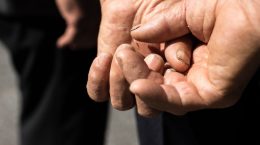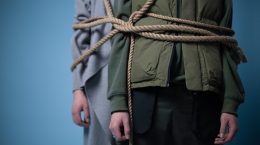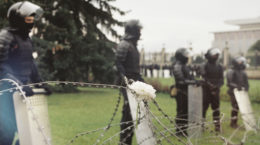Nowadays the Lukashenko‘s regime has been building a GULAG in Belarusian prisons – a copy of the same sadly known Soviet GULAG which actively exploited the free of charge labor of its prisoners.
Law enforcement agencies of Belarus do not stop at repressions, they go further in their actions to destroy even human dignity itself. Prisoners, including on political charges, as well as juveniles, are turned into slaves whose main task is to bring profit to Belarusian jailers.
There is nothing particularly original here. So, the exploitation of the prisoner‘s labor flourishes in many countries where the power authorities do not regard the rights of their citizens. These ones include China, Russia, Iran, Pakistan and many African dictatorships. And, unfortunately, Belarus located in Europe among them too.
The hypothetical difference is that the Belarusian regime prides itself on using prisoners as slaves and even make documentaries about it.
One of these films you can see on the link. The Ministry of Internal Affairs made this video commercial one, but after noticing the attention of Our House to the subject of the Belarusian state slavery the film was quickly removed from public access. Our House managed to download it in advance in order in to save evidence
For instance, a film released by the Belarusian Ministry of Internal Affairs says that the organizations of the penitentiary system annually produce products worth about $100 million. A range of manufactured products includes metal products, furniture, small architectural forms, clothing and footwear products, construction products, products of agricultural applications, wood products, componentry, household goods.
Prison labour in Belarus has already formed a whole industry with its own statistics. For example, 33.3% in the structure of production of the Belarusian colonies are metal products, 10.6% – woodworking, 20.7% – clothing products, 20% – furniture, 15.4% – other products. Everything begins, according to the old Soviet-Gulag tradition, with timber lumbering.
Prison labor is used within a whole extensive system of subordinated production sites. In particular, the Ministry of Internal Affairs boasts that the industrial assets of the penitentiary system of Belarus include:
- 27 production units;
- more than 1200 managers and service personnel;
- more than 27,000 employees;
- over 150,000 square meters of production space;
- over 700 units of tractor vehicles;
- more than 7,400 units of technological equipment
As you can see, here we are talking about a whole compact industrial empire. Nevertheless, many residents of Belarus still do not suspect that the beautiful furniture formally produced by Pinskdrev, or new double-glazed windows for their houses, or even comfortable children’s shoes from some little-known factory, are, in fact, the result of a literally slave labor of people deprived of all rights in our country. As well as things like embroidered tablecloths, fuel briquettes, pellets, prefabricated wooden houses, auto parts, car numbers, yard gazebos and trash cans.
The utter cynicism is also the pathos and even gloating with which the Belarusian jailers themselves list their advantages over other market competitors who do not use neither slave labor nor state benefits. Here is the advantage list voiced by the Interior Ministry itself:
- Permanently functioning state-owned enterprises with a positive economic balance;
- Tax benefits;
- Benefits for the provision of timber;
- Constant availability of labor force with the possibility of further retraining;
- Availability of production facilities, equipment and transport
- Staffing with production personnel;
- The possibility to place promising production enterprises taking into account geography location, enterprise profile and the peculiarities of logistics.
The most terrible thing in all this is that the industry created by the penitentiary system turned out to be very commercially successful. This is quite understandable. In fact, there is practically no component of the production cost such as wages, contracts, social insurance or contributions to the pension fund. And since the industry is commercially successful, it means that there is a sense and a desire to expand it with further increasing production volumes. But this requires more and more prisoners …
Isn’t that one of the secrets why in Belarus both the courts issue only 0.2 percent of acquitting sentences and law enforcers with such passion and bitterness send young people to jail on ‘narcotic’ articles, frequently on petty charges as well as unfounded or far-fetched accusations? In fact, in the absence of even allusion to the rule of law we got in Belarus a vicious circle of slavery.
The security officials benefit from the slave labor of prisoners, which means that prisons and colonies must be replenished. Such replenishing, in turn, is impossible without a lot of new prison sentences, which means that these sentences will be given to people ‘for drugs‘, ‘for extremism‘, ‘for economic crimes‘, for whatever reason. Lukashenka’s prison enterprises (the new Belarusian Gulag) need more slaves.
Human Rights Defenders of Our House








